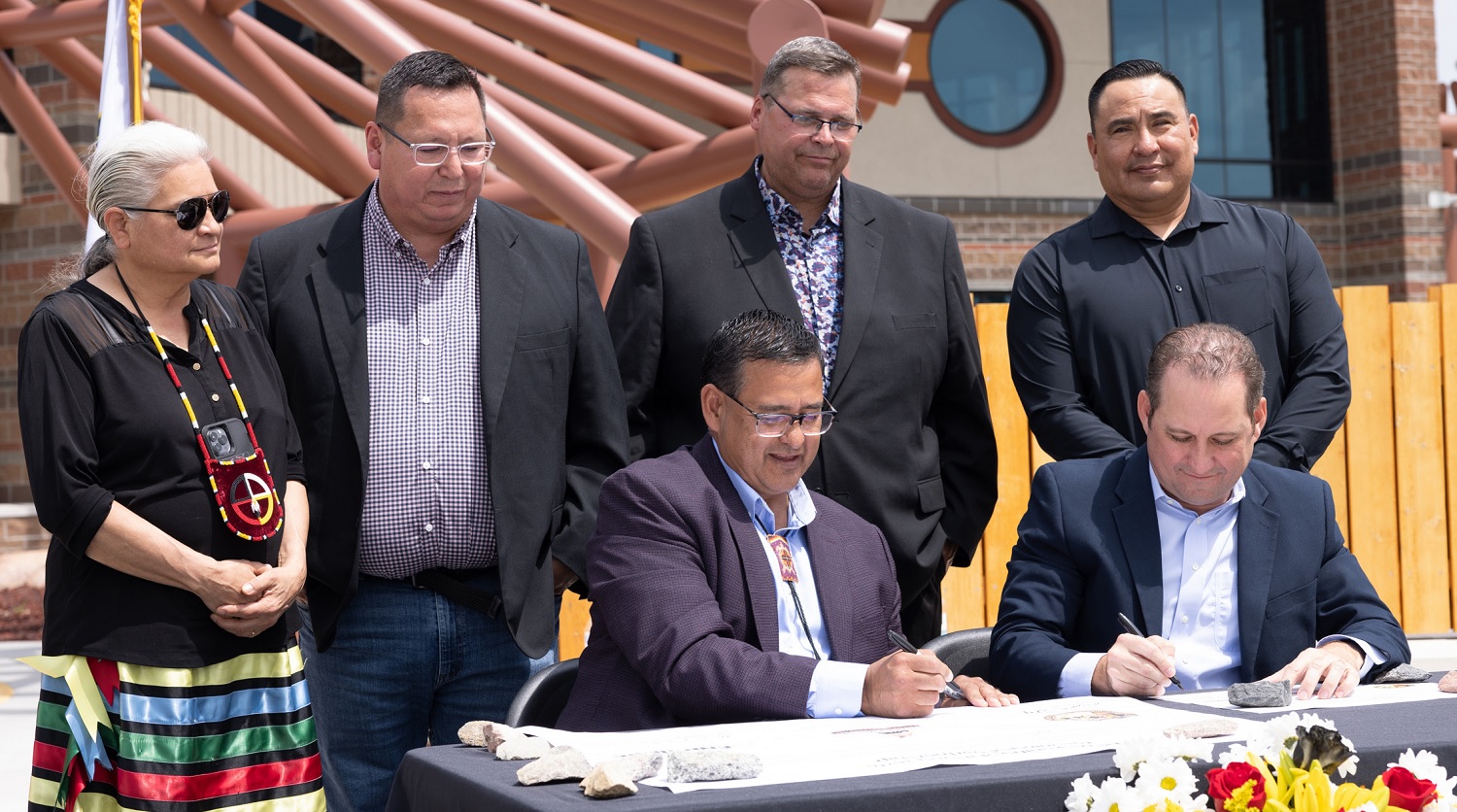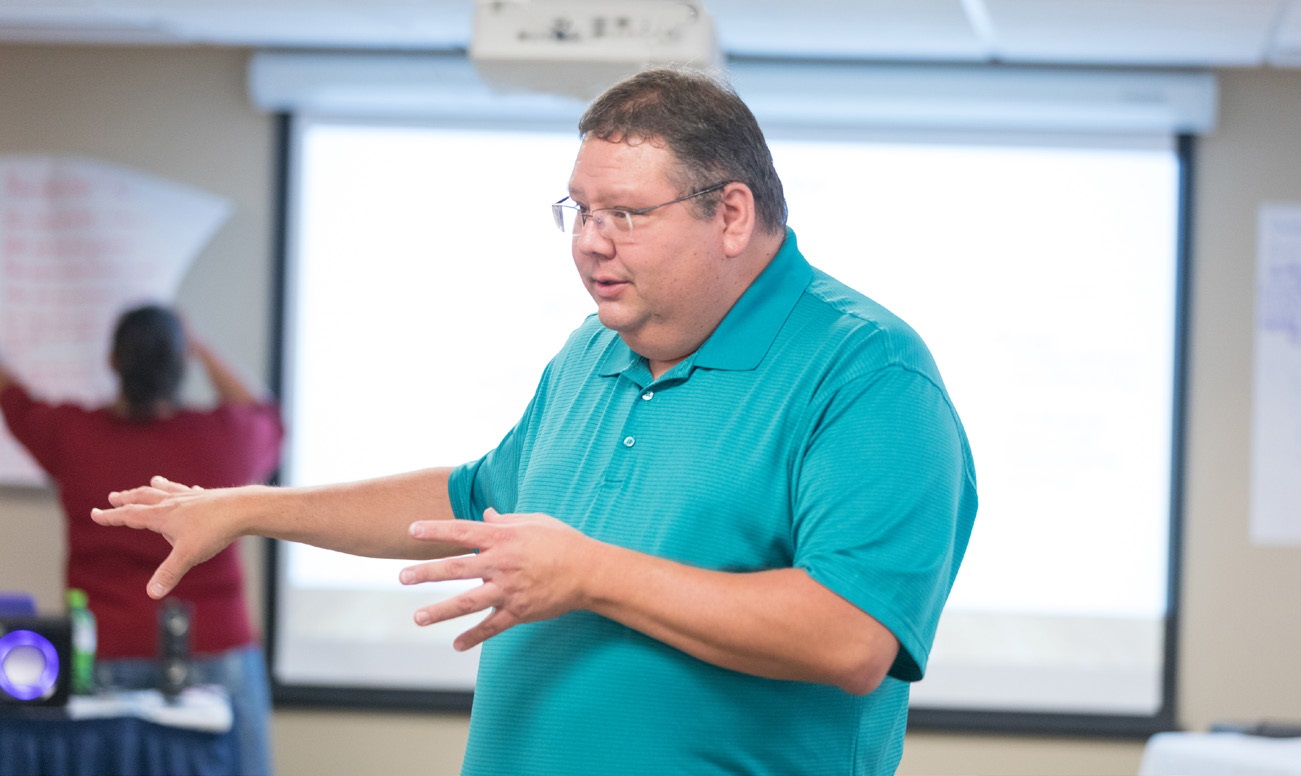Can Native communities benefit from pipelines?
Source: As seen in our paid articles in the Wisconsin State Journal, Red Lake Nation News
Date: Sept. 24 and Oct. 23, 2023
“There are economic benefits from participation in pipeline projects and in the business,” said Paul Eberth, head of Indigenous Engagement at Enbridge, which operates the world’s longest liquids pipeline system. “But there are other benefits as well. At Enbridge, we believe that through close collaboration with Native communities, we’ve helped Indigenous people better protect their communities and important resources.”

Connecting Tribal energy to markets: Mark N. Fox, Chairman of the MHA Nation, seated left, and Enbridge's Mike Koby sign pipeline sale agreement. Standing at rear are members of the MHA Nation’s Tribal Business Council including, from left: Monica Mayer MD, Robert White, Bernie Fox (CEO of Thunder Butte Petroleum), and Fred Fox.
Stories of partnership, respect, opportunity and progress
Here are some examples of Indigenous engagement and positive outcomes:
- First Tribal Shipper: In June 2023, Thunder Butte Petroleum Services Inc.—owned by the Mandan, Hidatsa and Arikara Nation of North Dakota—purchased the Plaza/Wabek Pipeline from Enbridge for $5 million. The oil producing MHA Nation will soon become the first Tribal shipper on the Enbridge system.
“We are looking forward to the partnership with Enbridge through the acquisition of the Plaza/Wabek pipeline. Becoming one of the first Tribal shippers on the Enbridge system is a win-win situation. Creating an avenue of transmission to move our energy trust assets and resources to the marketplace will help further support various projects, programs, infrastructure, and increase our nation’s standard of living,” said Mark Fox, Tribal Chairman at MHA Nation. “Enbridge interacted with respect and professionalism throughout the process, and it has been a pleasure to work with them.” - Engaged, respected, included: As part of a pipeline replacement project in northern Minnesota, more than 30 Native American Tribes contributed to an Enbridge-funded Tribal led cultural resources survey spanning over 330 miles—the largest such survey in history. Findings shaped the project’s route and protected culturally sensitive areas.
Enbridge committed to spend $100 million during Line 3 construction in Minnesota on doing business with Native American owned companies and hiring and training Native American workers. Enbridge actually spent four times that amount—over $400 million specifically with Indigenous businesses, workers and communities. - Lifting off to better lives: In the Canadian province of Alberta, 23 Indigenous communities collectively acquired an 11.57% stake in seven pipelines in the oilsands region for $1.12 billion (in Canadian dollars)—a historic partnership that’s believed to be the largest of its kind in North America.
“Our partner logo theme—Seven Pipelines, Seven Generations—speaks to the long-term value potential of these assets, which will help enhance quality of life in our communities for many years to come,” said Justin Bourque, president of Athabasca Indigenous Investments, the organization created from the alliance of the 23 Indigenous communities.
Can Indigenous people in the Midwest benefit as well? Short answer: Yes.
- A partnership between Enbridge and Five Skies Training and Consulting is providing free empowerment and job skills training to Native workers seeking meaningful careers. Enbridge has supported the training of more than 200 Indigenous people in the Midwest.
“Everyone who has graduated through our program has had an opportunity to go to work,” said Nick Kedrowski, co-owner of Five Skies Training and a member of the Oneida Nation in Wisconsin. “But they didn't have to go to work on the pipeline—that was never a requirement from Enbridge. The training was available to basically anyone who was interested and willing to put in the time.” - Looking ahead: Pipelines will bring even more benefits. Once approved, the $450-million Line 5 Wisconsin Segment Relocation Project—which will build 41 miles of pipeline around the Bad River Reservation in northern Wisconsin—will create 700 construction jobs and add $135 million to Wisconsin’s economy.
- Dollars and jobs have been earmarked for Native communities: The Line 5 relocation project will spend $46 million with Native American owned businesses and on wages for Tribal members. Enbridge has committed to training and hiring Native Americans for at least 10% of its Line 5 construction workforce.
- Support from local communities: Every landowner—there are about 300 in total—along the proposed route for Line 5 has agreed to the project, which is designed based on conversations with local communities and the results of a Tribal cultural resource survey. Enbridge is committed to safety and environmental protection and wants to ensure important Tribal cultural resources are protected.
 Nick Kedrowski co-owner of Five Skies Training and a member of the Oneida Nation in Wisconsin providing empowerment and job skills training.
Nick Kedrowski co-owner of Five Skies Training and a member of the Oneida Nation in Wisconsin providing empowerment and job skills training.
- Support from local communities: Every landowner—there are about 300 in total—along the proposed route for Line 5 has agreed to the project, which is designed based on conversations with local communities and the results of a Tribal cultural resource survey. Enbridge is committed to safety and environmental protection and wants to ensure important Tribal cultural resources are protected.
Enbridge’s Line 5 relocation project is ready to go. For the Midwest and its Native communities, it brings a future of opportunities.
About Enbridge Inc.
We have been in the Midwest for more than 70 years, safely connecting millions of people to the energy they rely on every day, fueling quality of life through our North American natural gas, oil or renewable power networks and our growing European offshore wind portfolio. We’re investing in modern energy delivery infrastructure to sustain access to secure, affordable energy and building on two decades of experience in renewable energy to advance new technologies including wind and solar power, hydrogen, renewable natural gas and carbon capture and storage. We’re committed to reducing the carbon footprint of the energy we deliver, and to achieving net-zero greenhouse gas emissions from our operations by 20501, 2.
1 GHG emissions included within our targets are from assets over which we have operational control (Scope 1 and Scope 2 emissions). Projected reductions of GHG emissions intensity and absolute emissions is relative to the 2018 baseline year. For more information, see our 2023 Sustainability Report.
2 Absolute emissions.
Paid advertisement. Learn more at enbridge.com/indigenous








